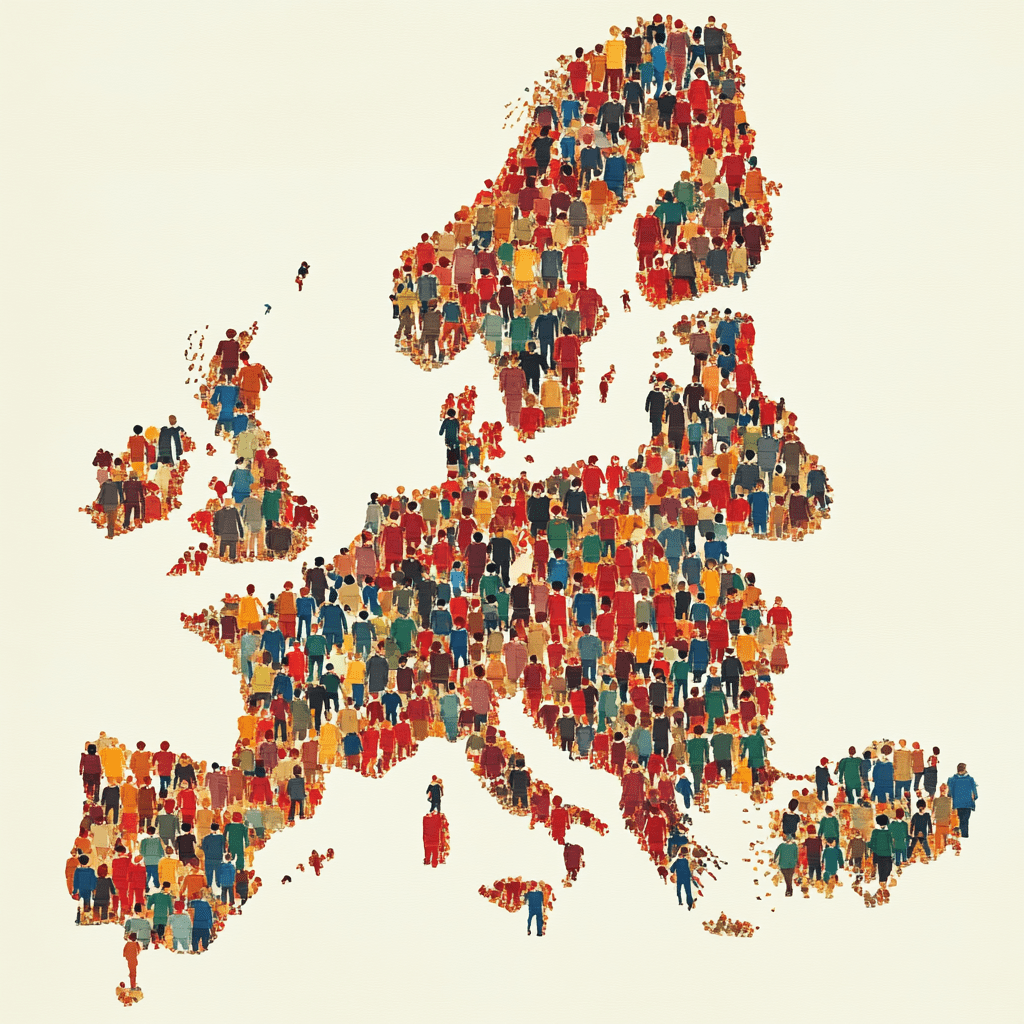Commentaries

The global financial system is at a crossroads of two related processes: post-crisis reform—the so-called Basel III—that is missing its final stage, and the new political course in the United States, where the incoming administration has declared war on all pre-existing rules.

A recently published report by the Institute for European Policymaking, written by a multidisciplinary team of researchers at Bocconi University and the Toulouse School of Economics, provides timely insights into these challenges and offers concrete policy recommendations across three critical areas

In a nutshell, we see that 80 years of prime partnership have created a solid base of mutual appreciation and similar sensitivities. Europeans and Americans still see in the other their most valuable ally, NATO is highly regarded and cooperation trumps competition. However, eight years of American hyper-polarisation at home and mixed messaging abroad have taken their toll. In 2024, 63 percent of Europeans agree that it is time for Europe to go its own way.

Reduced economic insecurity generates not only a direct increase in demand for populist commitments but also a change in culture in the direction of lower trust and prevalent exclusionary rhetoric, which in turn are further indirect channels through which populist movements thrive

“The Commission would like to be taking the lead on defense policy, but defense remains the domain of Member States”. Thomas Gomart is one of the most influential experts on foreign relations and geopolitics at the EU level: he has been director of the Ifri, Institute Francais de Relationes Internationales, since 2015. An expert in Russian geopolitics and the history of international relations, he has recently published the book L'accélération de l'histoire. Les noeuds géostratégiques d'un monde hors de contrôle ( Éditions Tallandier, 2024).

The first elected president of the European Council, Herman van Rompuy, discusses how to fix the decision-making process at the EU level

On 16 October 2024, Claudia Buch delivered a lecture titled Bank Profitability: A Mirror of the Past, Creating a Vision for the Future at Bocconi University. The event was co-organized by the Baffi Center on Economics, Finance, and Regulation and the Institute for European Policymaking @ Bocconi University (IEP@BU).


On September 19, mister Roth gave a lecture to Bocconi students titled “Europe at the Crossroads: Turning Today’s Poly-Crisis Into Tomorrow’s Poly-Opportunity”. Eleanor Spaventa, a professor of European Law at Bocconi and a member of the IEP@BU managing board, chaired the event co-hosted by IEP@BU and the Department of Legal Studies.

While the focus of the new Commission will be crystallizing over the months and years to come, this short analysis of the mission letters for the future Commissioners suggests that the recent intervention of Mario Draghi on Europe’s competitiveness has been agenda-setting for the policy priorities as defined by Commission President Ursula von der Leyen.


The September 2024 state elections in Germany mark a low point in public support for the governing left-wing coalition and a high point for the populist right. Often overlooked, the elections might also mark the fading of the German socialist party Die Linke into political irrelevance. Its demise teaches us valuable lessons for modern European politics

The report on The Future of European Competitiveness presented by Mario Draghi provides a clarion call for economic reforms to stop Europe’s relative decline. This short comment cannot do justice to the report with over 300 pages of supporting material. We will concentrate just on two key messages regarding innovation and investment.

If Trump is elected in November 2024, the security outlook of Europe could deteriorate very fast as Russia may attempt to seek the opportunity of taking NATO off balance. It is therefore essential that the Commission and the forthcoming Defence Commissioner begin the policy planning and design well in advance and preferably as soon as they take office, as to move past preliminary negotiations and have blueprints ready for approval should the situation require it.

There are lessons to be learned by comparing the most recent elections in France and the UK. The French electoral system is characterized by two-turn constituency elections where several short-listed candidates qualify for a second round should no-one reach more than 50% of the votes in the first round. The British system, conversely, assigns a given constituency seat to whoever wins the plurality in a given constituency, regardless of whether or not the candidate reaches 50%.

While defense procurement and production remain fragmented across Europe and the EU and its member states invest less in their security and defense than the US, new EU and EU-sponsored initiatives demonstrate that Europeans are aware of this and attempt to reduce these shortcomings – political and fiscal obstacles notwithstanding.

A key area of frustration for voters on both the left and the right is the poor performance of the NHS. With ever-longer waiting lists for hospital appointments and declining local services, voters are deeply concerned about the state of their beloved health service.

European politics has become more fragmented which makes governing a tall task, but also makes the EU more political. After decades of being perceived as too technocratic and distant, the fight for the European Union’s top jobs became more highly anticipated and much more political.

The European Sovereign Bond market gyrations erupted in the wake of President Emmanuel Macron’s call for a snap parliamentary vote after his party’s defeat to Marine Le Pen’s National Rally in the European elections have sparked a debate on the opportunity of an activation of the Transmission Protection Mechanism (TPI).

It is therefore possible that even the election of the Commission President will not change the overall picture, with the real game taking place whenever the European Parliament is called to vote on the fundamental choices that Europe will face in the coming years, from managing the digital and green transitions to fundamental decisions on the common defense and security policies.

In our first forecast for the EP 2024 elections based on our model, in January 2024, we predicted a “sharp right turn”. In our latest forecast, and our final one before the election, we are still forecasting that the next EP will be considerably more right-leaning than the current one, and that the two groups to the right of the EPP will be considerably larger than they currently are.

ASML has a global monopoly on EUV, the most advanced lithography technology that is on the Wassenaar Arrangement list of dual-use technologies and requires an export license. The Dutch government approved the export license of EUV-technology to China in 2018. The US government was not pleased and tried to press its ally to consider the security issues.

These findings stem from a survey conducted in December 2023, encompassing nearly 13,000 EU citizens. Our dataset is representative of the EU as a whole and, more specifically, of Belgium, France, Germany, Italy, the Netherlands, Poland, and Spain. In Italy, we interviewed 1,325 citizens.

With many new restrictive measures in place one would have expected trade to fall. However, the most one can say is that globalisation has turned into slowbalisation.

Elisabeth Braw, a widely respected expert in international relations and security, is currently a senior fellow at the Atlantic Council, a think tank based in Washington, D.C. Before transitioning to research, she was a journalist, a background that informed her recent book published by Yale University Press, titled Goodbye Globalization: The Return of a Divided World.

European automakers currently face increasing pressures. While the region’s manufacturers long dominated global sales revenues, several competitors from Asia have recently moved into the top ten. But European companies have faced similar difficulties before, and the responses of the region’s automakers and policymakers to previous challenges offer insight for the present, especially on the issues of global competition and energy transition.

It is now over two years since Russia launched its brutal full-scale invasion of Ukraine. Ever since those early days, a broad network of CEPR economists has been working intensively with colleagues in Ukraine and across the international research and policy communities to explore how to tackle the big economic challenges of the war and how to plan for the country’s post-war reconstruction.

The concept of green backlash has recently become more salient in the news, in part due to the widespread farmers’ protests held in a number of European countries. However, there is so far not much robust empirical evidence of an electoral penalty against governments that implement ambitious climate policies.

The EU-sponsored Eurobarometer polls routinely estimate support for EU defence integration between 70% and 80% of respondents, while a recent poll by the independent Bertelsmann Stiftung polling branch, Euopinions, returned a 87% support level. However, the devil is in the details: what is meant by “European defence policy” can wildly differ between people, and these simple questions present no trade-offs.

The pattern of macroeconomic catch-up seen in the EU’s enlargement process is a remarkably positive story - if largely unsung and still incomplete. The catch-up achieved so far constitutes a key backdrop to today’s debate about further enlargement. Without the rapid growth of the most recently acceding states it would be impossible for the EU to contemplate taking further poor members.

The euro area has been subject to a series of very different shocks, some of which, such as the COVID-19 pandemic, were unprecedented. While the ECB’s reaction to these deflationary shocks was vigorous, it persisted too long with its expansionary measures and failed to see their inflationary impact when energy prices shot up. The future is likely to bring new challenges, but climate change might not be the most important threat to price and financial stability.
This document was provided by the Economic Governance and EMU Scrutiny Unit at the request of the Committee on Economic and Monetary Affairs (ECON) ahead of the Monetary Dialogue with the ECB President on 15 February 2024.

The climate diplomacy surrounding the COP28 summit has taken center stage in the inaugural session of the working lunch series organized by the Institute for European Policymaking in collaboration with the European Council on Foreign Relations and the SDA Bocconi School of Management.

On December 200,2023, The European Parliament and the Council agreed on five key proposals of the New Pact on Migration and Asylum proposed by the EU Commission in September 2020 and aimed at creating a uniform system of regulations and policies around migration and asylum for the EU. The main aim of the new pact was to replace the Dublin system which relied heavily on first-country-of-entry criteria creating a burden for frontline member states.

The new framework has a higher degree of built-in flexibility. By tailoring fiscal adjustment to the situation of individual countries, the reform overcomes one major issue with the previous set of rules – namely the excessive use of flexibility clauses and overlays, to soften the otherwise too strict uniform adjustment paths.

The Council and High Representative for foreign Affairs must ensure that Common Foreign and Security Policy do not deprive individuals of their rights, and must, as a matter of EU constitutional law, include in all instruments a jurisdictional clause indicating the national court responsible to ensure effective judicial protection.

Inflation rates in the euro area and US increased sharply in 2022, in part following large energy price shocks. This column analyses the pass-through from energy prices to core inflation since the 1970s for the US and Germany. It shows that this pass-through is not constant over time, but time-varying. Pass-through from energy to inflation during the 1970s was high in the US, but not in Germany. Both countries experienced high pass-through in 2022, but this has declined in the most recent quarters, consistent with a return to more normal inflation dynamics.

As the discussion on the next EU enlargement that might include Ukraine in the bloc proceeds, the support of European citizens to support Ukrainians remains solid but not as solid as in the recent past. Eupinions - a Bertelsman Stigtung project - has monitored how the EU sentiment has evolved towards Ukraine over 18 months.

We identify specific industrial products that are projected to be in high demand in the EU and can be realistically produced given North African countries’ existing capabilities. Specializing in these products, North African countries can diversify their export basket, which has been shown to correlate positively with economic development.

The US and the euro area have similar headline inflation rates, but very different drivers. In the US, inflation is mainly driven by housing costs. By contrast in the euro area energy now provides an important negative element, that is offset to a large extent by still increasing food prices

La Nota di aggiornamento del Documento di Economia e Finanza indica che la stabilizzazione del debito pubblico italiano richiede il raggiungimento di un surplus primario superiore al 3% del Pil nel giro dei prossimi 3-4 anni. Una manovra restrittiva di questo tipo non ha precedenti storici.

On November 13, the Institute for European Policymaking co-organized with IAI, the Istituto per gli Affari Internazionali, an event in Rome dedicated to discussing the implication of the US Industrial Reduction Act on European industries and, specifically, on Italian companies.

Ralph Ossa, a professor of Economics at the University of Zurich currently on leave, has been appointed as the WTO chief economist in the most challenging time for the organization. In the first World Trade Report since his appointment, Ralph Ossa and his colleagues challenge the prevalent narrative of an inevitable decline of globalization that we have experienced in the last three decades.




















